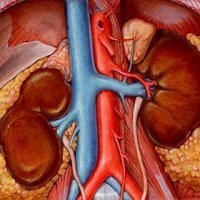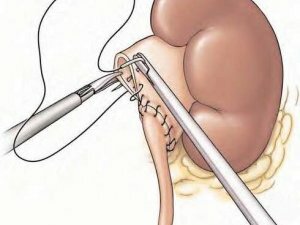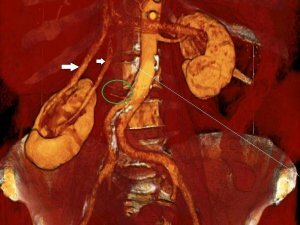Chronic Renal Failure

Chronic renal failure is a complex of symptoms that is the result of the progressive death of nephrons. This condition is accompanied by a gradual deterioration in the functioning of the kidneys and a disturbance in vital processes.
causes of chronic renal failure( CRF)
most frequent cause of chronic renal failure was previously glomerulonephritis, but today ranks first diabetes. CRF against the background of diabetes mellitus is observed in 20-40% of patients first targeted for hemodialysis.
Other causes of chronic renal failure are:.
- About 21% of patients suffer from chronic renal failure resulting from renal damage vascular naprmer due to stenosis( narrowing) renal arteries of hypertensive nefroangioskleroz etc.
- In 19% of cases of chronic renal failure develops due to lesion of the renal glomerulus( Glomerulopathy and glomerulonephritis).
- Approximately 6% of all cases of chronic renal failure is a consequence of cystic diseases( development of pathological cavities within the body), polycystic kidney disease, etc.
- About 4% -. A result of destruction of the parenchyma and the kidney tubules( urolithiasis, pyelonephritis, drug interstitial nephritis, prostate adenoma).
Symptoms of the disease
In chronic renal failure, changes occur in organs and systems of organs due to toxic effects on them of metabolic products. In patients with CRF, dry and yellowish color of the skin due to accumulation of urochrome, sharply reduced sweating due to atrophy of the sweat glands. The patient suffers from severe itching, especially at night.
Constant fluid retention in the body leads to the development of congestive heart failure. This phenomenon can lead to the formation of an aqueous lung( English fluid lung).Over time, fluid can accumulate in the pericardium, in the pleural cavity. All this is accompanied by hypertension, which occurs in 50% of cases of CRF.
In addition, renal failure( chronic) causes hypocalcemia, as the absorption of calcium in the intestine is impaired. As a consequence, osteofibrosis and osteomalacia develop. An overwhelming majority of patients with chronic renal failure have anemia. And terminal CRF is always accompanied by anemia. Due to the active release of ammonia, urea, creatinine, an unpleasant aftertaste appears in the mouth, the patient suffers from nausea, loss of appetite. Constant release of metabolites causes damage to the mucous membranes, stomatitis, gastroenterocolitis develops, which is often accompanied by ulceration and erosion. CRF
Treatment Treatment is prescribed depending on the stage of the disease, its rate of development, the presence of the main syndromes main clinical features of the disease, which led to chronic uremia. Active and continuous treatment is particularly necessary to patients who have developed clinical picture of chronic renal failure, accompanied by metabolic acidosis, hyperasotemia, disturbances in water and electrolyte balance, circulatory failure and hypertension. These cases require the conduct correction of water-salt balance, alignment of the acid-base balance, azotemia, treatment of anemia, hemorrhagic, hypertensive syndromes, maintaining cardiovascular function.
At the head of the therapeutic treatment is a diet with a low protein content, a constant control over the intake of sodium ions from the diet, a decrease in physical activity, adequate fluid intake under the constant control of diuresis per day. A very good effect can be achieved with drugs that improve the blood flow of the kidneys( troxevasin, trental), furosemide. The latter requires the selection of an adequate dosage taking into account renal dysfunction.
Moreover, in the treatment of chronic renal failure, peritoneal dialysis, program hemodialysis, and kidney transplantation are applicable.



